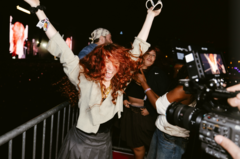Discover the meticulous planning and teamwork that goes into each performance at Eurovision, balancing fun and extreme precision for a spectacular event.
**Behind the Scenes of Eurovision: Meet the Crew Making Magic Happen**

**Behind the Scenes of Eurovision: Meet the Crew Making Magic Happen**
A behind-the-scenes look at the crew working tirelessly to ensure a flawless Eurovision show.
Throughout the glitzy and glamorous Eurovision Song Contest, there exists a dedicated team known as the 'invisible crew', tasked with executing near-impossible set changes in just 35 seconds. This rapid turnover requires a well-coordinated effort to reset the stage for the next performer, ensuring that every prop, microphone, and lighting setting is flawlessly in place.
Richard van Rouwendaal, a Dutch stage manager, leads the charge during these highly demanding changeovers, which he likens to a ‘Formula 1 tyre change.’ With each crew member assigned a specific, singular duty — whether that be carrying a light bulb or a prop — they practice their choreography relentlessly. Weeks prior to the contest, the crew rehearses, utilizing stand-ins from local performing arts schools to simulate performances and refine their timings.
"We have about two weeks to master each set change," Van Rouwendaal explains, emphasizing the importance of staging in creating memorable performances. Every aspect of the production is meticulously planned, with the team expected to work in unison without stepping off-course. "It's all about precision," he adds, "like ice skating where every move must be calculated."
The meticulous detail holds even backstage, where each performer has personalized microphone stands adjusted to their specific needs. The meticulousness is so high that even a slight change in footwear can throw everything off, potentially altering the height of the microphone.
The crew's challenges aren't purely logistical; they face unique hurdles based on the performances themselves. Last year's contest presented a taller stage that demanded hefty props be transported up steep ramps, exhausting crew members with each transition. This year's setup is deemed more manageable, with clever methods of organization employed to streamline moving props.
The backstage area operates like a well-oiled machine, with props cycled from entry to exit, using secret passageways to obscure any shifts during the live show. On occasion, improvisation becomes necessary — as when Van Rouwendaal quickly slipped an electric guitar onto stage during a crucial performance, drawing on a level of teamwork that operates behind the streaming spectacle.
In the event of mishaps, a series of contingency plans has been devised; a “stage not clear” announcement can provide quick moments of backup, allowing directors to seamlessly cut to audience shots or pre-recorded footage to maintain viewer engagement.
Recently, preparations for a new performance that involves sand have also been factored into the hectic agenda, requiring specialized staging adjustments that contribute to the collective stress of live broadcasting. Even amidst the pressure, organizers focus on the welfare of contestants and crew through enhanced rehearsals and creating relaxed spaces where cameras aren’t permitted.
While the demands are immense, team bonding occurs amid the chaos, with Van Rouwendaal striving to maintain a lighthearted atmosphere. From sharing beloved Dutch treats to celebrating successful rehearsals, the backstage camaraderie fosters both enjoyment and efficiency.
Without this dedicated yet largely unseen crew, the spectacular show that captivates viewers around the globe wouldn’t be possible — and as they master the operation in silence, the real magic of Eurovision continues to unroll.
Richard van Rouwendaal, a Dutch stage manager, leads the charge during these highly demanding changeovers, which he likens to a ‘Formula 1 tyre change.’ With each crew member assigned a specific, singular duty — whether that be carrying a light bulb or a prop — they practice their choreography relentlessly. Weeks prior to the contest, the crew rehearses, utilizing stand-ins from local performing arts schools to simulate performances and refine their timings.
"We have about two weeks to master each set change," Van Rouwendaal explains, emphasizing the importance of staging in creating memorable performances. Every aspect of the production is meticulously planned, with the team expected to work in unison without stepping off-course. "It's all about precision," he adds, "like ice skating where every move must be calculated."
The meticulous detail holds even backstage, where each performer has personalized microphone stands adjusted to their specific needs. The meticulousness is so high that even a slight change in footwear can throw everything off, potentially altering the height of the microphone.
The crew's challenges aren't purely logistical; they face unique hurdles based on the performances themselves. Last year's contest presented a taller stage that demanded hefty props be transported up steep ramps, exhausting crew members with each transition. This year's setup is deemed more manageable, with clever methods of organization employed to streamline moving props.
The backstage area operates like a well-oiled machine, with props cycled from entry to exit, using secret passageways to obscure any shifts during the live show. On occasion, improvisation becomes necessary — as when Van Rouwendaal quickly slipped an electric guitar onto stage during a crucial performance, drawing on a level of teamwork that operates behind the streaming spectacle.
In the event of mishaps, a series of contingency plans has been devised; a “stage not clear” announcement can provide quick moments of backup, allowing directors to seamlessly cut to audience shots or pre-recorded footage to maintain viewer engagement.
Recently, preparations for a new performance that involves sand have also been factored into the hectic agenda, requiring specialized staging adjustments that contribute to the collective stress of live broadcasting. Even amidst the pressure, organizers focus on the welfare of contestants and crew through enhanced rehearsals and creating relaxed spaces where cameras aren’t permitted.
While the demands are immense, team bonding occurs amid the chaos, with Van Rouwendaal striving to maintain a lighthearted atmosphere. From sharing beloved Dutch treats to celebrating successful rehearsals, the backstage camaraderie fosters both enjoyment and efficiency.
Without this dedicated yet largely unseen crew, the spectacular show that captivates viewers around the globe wouldn’t be possible — and as they master the operation in silence, the real magic of Eurovision continues to unroll.





















